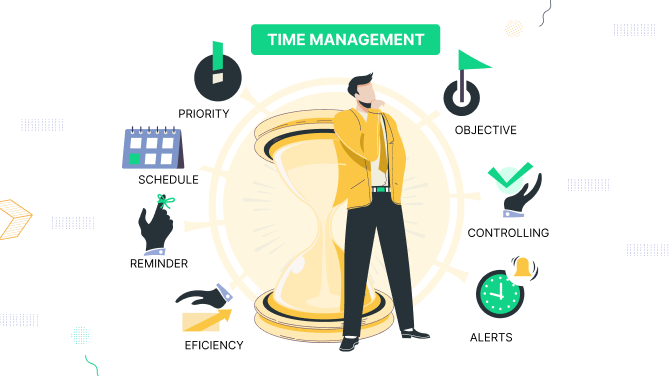Why is Time Management Important and How to Get More Done

I’d say time management is very akin to keeping a diet (if you know what I mean) – in that both require discipline to create a sustainable plan and balance to avoid feeling overwhelmed or anxious.
Poor time management? Guilty feelings, anxiety, and the feeling of never having enough time on the plate? When was your last weekend that you didn’t need to work? Have you lost the feeling of accomplishment and happiness?
Or vice versa, finding it difficult to motivate yourself to do simple work?
Oh, so many questions that could be solved with good time management.
Why is Time Management Important – Actually?

The simple answer is that life feels short.
When you manage your time well, you can achieve big goals – or simply meet deadlines more easily, and feel less disappointment.
Reduce stress, distraction, and avoid the pitfalls of multitasking and interruptions – all is pretty doable with a well-trained time management skill (yes, it is a skill and a habit that requires commitment and repetition).
Why managing time is important is the first question you ask when feeling not doing enough in this direction.
- Good time management is valued in cultures that value efficiency and productivity, such as in the USA and parts of Europe. To answer your question – no, it’s not the same in other cultures where the lifestyle is more relaxed, such as in Latin America or countries that celebrate the siesta.
- The main point of time management is to maximize output and minimize wasted time – to feel less disappointed at any task.
- It helps you stay in better health and reduce all types of stress in your work and personal life.
Time management is important because it helps you set and achieve goals with less stress. Time management is a skill and a habit. There is a steep learning curve and effort – just like with a diet.
Friends and Enemies of Good Time Management

Why can’t you start managing your time better so that there is a good work-life balance?
Psychologists name different reasons, such as procrastination, inability to prioritize things, poor planning skills (often because of no habit of planning!), constant distractions, and inability to deeply concentrate on your work. Those can also be personal problems that don’t allow you to concentrate your mind on rational things – but the latter are as a rule temporary reasons.
At the same time, those can be quite the opposite, ‘workaholic’ problems, such as overcommitting or perfectionism that often lead to burnouts, stress, and depression – which are definitely not best friends of productivity and good time management skills.
So what are friends of good time management and why is it important? The ability to prioritize and plan the most important things, setting goals and having a clear vision of the final result; the ability to delegate and have smart breaks.
Let’s visualize some of them:
| Enemies (problems) | Friends (solutions) |
| Procrastination | Focus on important tasks first |
| Lack of prioritization | Create schedules |
| Distractions | Schedule specific times to work on tasks without distractions (consciously remove distractions) |
| Multitasking | Concentrate on one task at a time |
| Perfectionism | Visioning your objectives and being happy once you achieve them |
| Poor health | Breaks, re-charges and various other ways to restore your energy |
| Depressed feelings | Refocus your energy |
Take a look at your day – do you have any of those? Where should you start looking deeper?
Based on your answers, you need to find your own, personalized way to achieve better results with time management’s friends.
How to Start Managing Your Time Better

Where do you start and battle your intimidation?
It’s pretty individual but you can definitely come up with your own step-by-step plan for better time management by relying on our template below:
- Reflect on your current habits to understand where procrastination occurs.
- Find a good motivator or competitor in your life – look at what they are doing and try to keep up and get yourself motivated to do something.
- Improve your prioritization skills: each day, make a list of tasks you need to accomplish. Prioritize these tasks based on urgency and importance using methods like the Eisenhower Matrix (urgent vs. important).
- Break down large tasks into smaller ones.
- Use techniques like the Pomodoro Technique (work for 25 minutes, then take a 5-minute break) to improve your focus on tasks.
- Create a daily or weekly routine consisting of work, breaks, personal activities, and all things that matter to you. Stick to that routine and don’t surrender!
- Think of apps or browser extensions that block distracting websites – we provide a list just below in the next chapter.
- Try and test different technologies for better time management: calendars, task management apps (Todoist, Trello), or time-tracking apps to understand and monitor your activities.
- Improve your self-discipline by simply sticking to your own time management plan.
- Reflect on your improvement and be ready to test out new things and build habits.
- Reward yourself and celebrate achievements.
Find an App for Time Management That Works for You

Apps or strategies help you find a reliable companion when it comes to building a new habit of time management. Of course, it takes a mix of psychological tactics mixed with a piece of technology, but it’s better to have both than just one.
| App | Category | Works for |
| Focus Timer | Smart timer | iPhone, iPad, and Mac |
| Fantastical | Calendar | Mac |
| TickTick | To-do list and productivity | Windows |
| BookingPress | Time and service scheduling app | WordPress sites |
| SelfControl | Block your own access to distracting websites | Free application for Mac |
| Trello | Visualized to-do lists | Web |
Fair Insights about Time Management: Things to Understand to Get More Done
Before we go further, here are three takeaways you should understand about time management, as well as why time management is important.
Experience is key.
Remember – you can achieve consistently good time management only with tasks you have experience with.
For new tasks, expect to encounter the so-called ‘planning fallacy’. Even more important, don’t let yourself be disappointed by time management struggles with new tasks. You’ll develop your time management skills for these new tasks only after you complete them, after getting a real hands-on experience with them.
Be fair with yourself.
Don’t try to game yourself by overestimating or underestimating your capabilities. Avoid unrealistic expectations from your productivity levels by honestly assessing your capabilities. Identify your strengths and weaknesses that can influence your ability to manage time.
Understand the brain chemistry behind habits.
Just like anything else, productivity is a habit. Habits are formed by specific neural connections that strengthen with repetition. Thanks to brain plasticity, you can actively shape these connections. This means you can build a habit of productivity, making effective time management an automatic part of your routine.
Bonus: Books & Podcasts about Time Management

Sometimes you just need to have a good read or listen to get inspired and start implementing a new habit of time management into your routine. Engaging with one of the materials you enjoy will help you get into the right mood – and get inspired.
Our recommendations are as follows, but you can search further to find suitable materials:
- Dopamine Detox: A Short Guide to Remove Distractions and Get Your Brain to Do Hard Things by Cameron Sepah: this book offers a fresh perspective on reclaiming focus and getting things done.
- Slow Productivity: The Lost Art of Accomplishment Without Burnout by Cathy Hackl: with this book, you’ll learn more about a sustainable approach to productivity that prioritizes well-being.
- Getting Things Done: The Art of Stress-Free Productivity by David Allen: this book is a perennial bestseller, with a comprehensive system for organizing tasks and achieving goals.
- The Art of Un-Multitasking Podcast: is a set of exceptional time management tips from Captain Time.
- The Productivity Podcast by Mike Vardy is focused on helping you maintain a healthier relationship with time.
Better Time Management Leads to a Happier You
Why is time management important?
Without effective time management, you may feel like you’re just keeping your head above water, feeling low, feeling no progress.
Better time management means a healthier lifestyle, better work-life balance, improved sleep, and – yes, a happier you.
FAQ
1. Why is time management important?
Time management helps you achieve your goals with less stress. It allows you to prioritize tasks, plan your day, and smartly avoid distractions. Usually, this means increased productivity, better work-life balance, and a feeling of accomplishment.
2. What are some benefits of achieving work-life balance through better time management?
A lot! But we’d focus on these:
- Reduced stress and anxiety.
- Improved physical and mental health.
- Increased productivity and focus at work.
3. What are some common enemies of good time management?
Procrastination, inability to prioritize, and distractions are all enemies of good time management. Perfectionism and overcommitting can also hinder your productivity.
Related articles:
